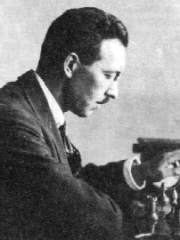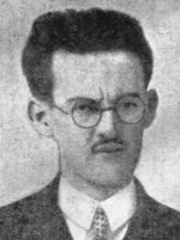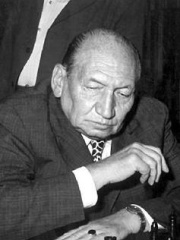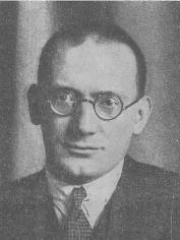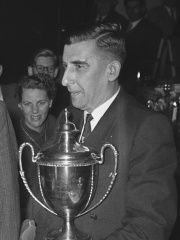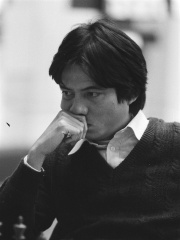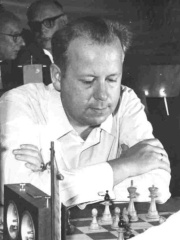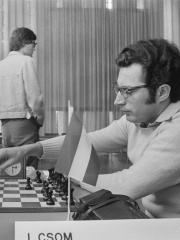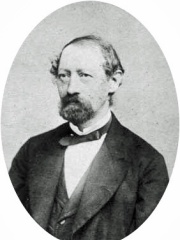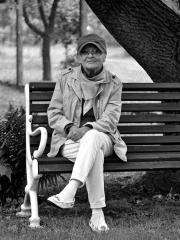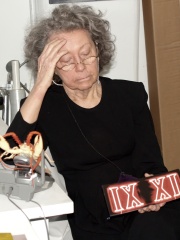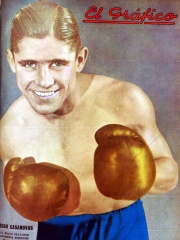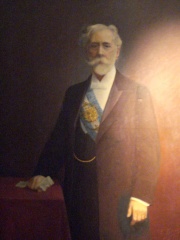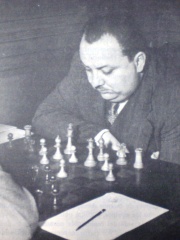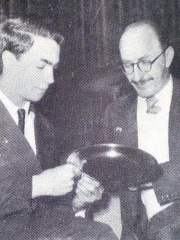CHESS PLAYER
Oscar Panno
1935 - Today

 Oscar Panno
Oscar Panno
Oscar Roberto Panno (born 17 March 1935) is an Argentine chess Grandmaster, and a civil engineer. Read more on Wikipedia
His biography is available in 20 different languages on Wikipedia. Oscar Panno is the 115th most popular chess player (up from 126th in 2024), the 317th most popular biography from Argentina (up from 418th in 2019) and the most popular Argentinean Chess Player.
Memorability Metrics
Page views of Oscar Panno by language
Among CHESS PLAYERS
Among chess players, Oscar Panno ranks 115 out of 461. Before him are Veselin Topalov, Philipp Stamma, Grigory Levenfish, Vasja Pirc, Peter Leko, and Erich Eliskases. After him are Ernst Grünfeld, Igor Bondarevsky, Eugenio Torre, Wolfgang Uhlmann, István Csom, and Tassilo von Heydebrand und der Lasa.
Most Popular Chess Players in Wikipedia
Go to all RankingsVeselin Topalov
1975 - Present
HPI: 58.12
Rank: 109
Philipp Stamma
1705 - 1755
HPI: 58.06
Rank: 110
Grigory Levenfish
1889 - 1961
HPI: 57.97
Rank: 111
Vasja Pirc
1907 - 1980
HPI: 57.95
Rank: 112
Peter Leko
1979 - Present
HPI: 57.94
Rank: 113
Erich Eliskases
1913 - 1997
HPI: 57.79
Rank: 114
Oscar Panno
1935 - Present
HPI: 57.78
Rank: 115
Ernst Grünfeld
1893 - 1962
HPI: 57.70
Rank: 116
Igor Bondarevsky
1913 - 1979
HPI: 57.66
Rank: 117
Eugenio Torre
1951 - Present
HPI: 57.48
Rank: 118
Wolfgang Uhlmann
1935 - 2020
HPI: 57.35
Rank: 119
István Csom
1940 - 2021
HPI: 57.35
Rank: 120
Tassilo von Heydebrand und der Lasa
1818 - 1899
HPI: 57.26
Rank: 121
Contemporaries
Among people born in 1935, Oscar Panno ranks 274. Before him are Syd Field, Rafer Johnson, Bernard Pivot, Robert Henry Lawrence Jr., Hrvoje Šarinić, and Hans-Jürgen Syberberg. After him are Giacomo Losi, Alfredo del Águila, Pedro Manfredini, Mari Törőcsik, Isabelle Collin Dufresne, and Michael Kahn.
Others Born in 1935
Go to all RankingsSyd Field
WRITER
1935 - 2013
HPI: 57.99
Rank: 268
Rafer Johnson
ATHLETE
1935 - 2020
HPI: 57.96
Rank: 269
Bernard Pivot
JOURNALIST
1935 - 2024
HPI: 57.90
Rank: 270
Robert Henry Lawrence Jr.
ASTRONAUT
1935 - 1967
HPI: 57.88
Rank: 271
Hrvoje Šarinić
POLITICIAN
1935 - 2017
HPI: 57.86
Rank: 272
Hans-Jürgen Syberberg
FILM DIRECTOR
1935 - Present
HPI: 57.81
Rank: 273
Oscar Panno
CHESS PLAYER
1935 - Present
HPI: 57.78
Rank: 274
Giacomo Losi
SOCCER PLAYER
1935 - 2024
HPI: 57.74
Rank: 275
Alfredo del Águila
SOCCER PLAYER
1935 - 2018
HPI: 57.66
Rank: 276
Pedro Manfredini
SOCCER PLAYER
1935 - 2019
HPI: 57.66
Rank: 277
Mari Törőcsik
ACTOR
1935 - 2021
HPI: 57.66
Rank: 278
Isabelle Collin Dufresne
WRITER
1935 - 2014
HPI: 57.64
Rank: 279
Michael Kahn
POLITICIAN
1935 - Present
HPI: 57.63
Rank: 280
In Argentina
Among people born in Argentina, Oscar Panno ranks 317 out of 1,154. Before him are Gabriel Calderón (1960), Oscar Casanovas (1914), Agustín Balbuena (1945), Norma Cappagli (1939), Manuel Quintana (1835), and Domingo Tarasconi (1903). After him are Tomás Maldonado (1922), Américo Gallego (1955), José Cura (1962), Héctor Baley (1950), Pedro Manfredini (1935), and Ricardo Infante (1924).
Others born in Argentina
Go to all RankingsGabriel Calderón
SOCCER PLAYER
1960 - Present
HPI: 57.86
Rank: 311
Oscar Casanovas
BOXER
1914 - 1987
HPI: 57.86
Rank: 312
Agustín Balbuena
SOCCER PLAYER
1945 - 2021
HPI: 57.83
Rank: 313
Norma Cappagli
CELEBRITY
1939 - 2020
HPI: 57.83
Rank: 314
Manuel Quintana
POLITICIAN
1835 - 1906
HPI: 57.83
Rank: 315
Domingo Tarasconi
SOCCER PLAYER
1903 - 1991
HPI: 57.79
Rank: 316
Oscar Panno
CHESS PLAYER
1935 - Present
HPI: 57.78
Rank: 317
Tomás Maldonado
PAINTER
1922 - 2018
HPI: 57.78
Rank: 318
Américo Gallego
SOCCER PLAYER
1955 - Present
HPI: 57.75
Rank: 319
José Cura
MUSICIAN
1962 - Present
HPI: 57.74
Rank: 320
Héctor Baley
SOCCER PLAYER
1950 - Present
HPI: 57.66
Rank: 321
Pedro Manfredini
SOCCER PLAYER
1935 - 2019
HPI: 57.66
Rank: 322
Ricardo Infante
SOCCER PLAYER
1924 - 2008
HPI: 57.66
Rank: 323
Among CHESS PLAYERS In Argentina
Among chess players born in Argentina, Oscar Panno ranks 1. After him are Roberto Grau (1900), and Julio Bolbochán (1920).
Oscar Panno
1935 - Present
HPI: 57.78
Rank: 1
Roberto Grau
1900 - Present
HPI: 51.97
Rank: 2
Julio Bolbochán
1920 - 1996
HPI: 51.39
Rank: 3


